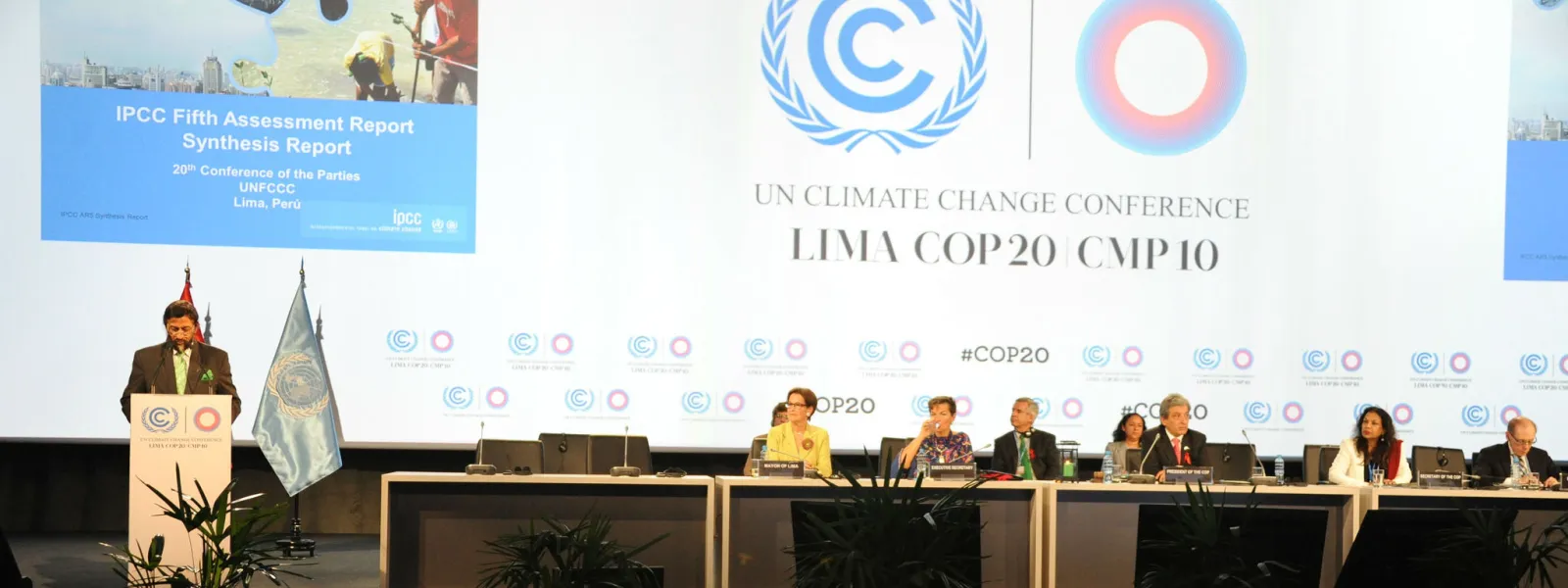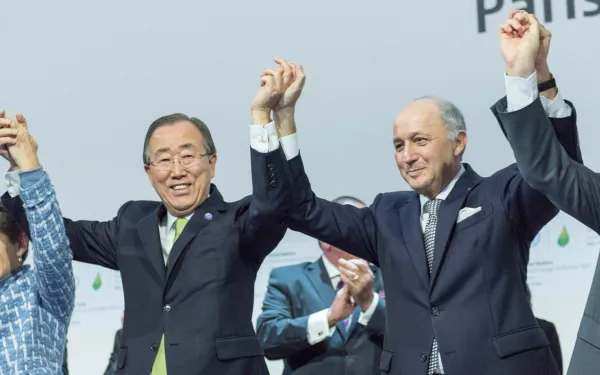
Project
Photo: UNFCCCMonitoring the UN Climate Negotiations
As changes in climate become more extreme, their affects are being hardest felt throughout developing countries. Since 1994, the United Nations Framework Convention on Climate Change has laid out actions to limit the increase of global average temperatures and confront the impacts of climate change.
The States that are Parties to the Convention meet every year in the so-called Conference of the Parties (COP) to review their commitments, the progress made in fulfilling them, and pending challenges in the global fight against the climate crisis.
At COP21 in 2015, they adopted the Paris Agreement, which seeks to strengthen the global response to the climate emergency, establishing a common framework for all countries to work on the basis of their capacities and through the presentation of Nationally Determined Contributions (NDC) that will:
- Limit the increase in global temperatures to 2°C compared to pre-industrial levels and continue efforts to limit it to 1.5°C;
- Increase the capacity of countries to adapt to the impacts of climate change; and
- Ensure that financing responds to the goal of reducing greenhouse gas emissions.
Our focus areas
THE CLIMATE CRISIS AND HUMAN RIGHTS
The climate crisis, due to its transversal character, has repercussions in various fields, geographies, contexts and people. In this regard, the Preamble to the Paris Agreement states that it is the obligation of States to "respect, promote and fulfill their respective obligations on human rights, the right to health, the rights of indigenous peoples, local communities, migrants, children, persons with disabilities and people in vulnerable situations and the right to development, as well as gender equality, the empowerment of women and intergenerational equity."
AIDA at the COP
COP25: Chile-Madrid 2019
At COP25 in Madrid, Spain, we advocated for the inclusion of the human rights perspective in various agenda items. We promoted the incorporation of broad socio-environmental safeguards in the regulation of Article 6 of the Paris Agreement, which refers to carbon markets. We closely followed the adoption of the Gender Action Plan, as well as the Santiago Network, created "to catalyze technical assistance […] in developing countries that are particularly vulnerable to the adverse affects of climate change." We also encouraged the inclusion of ambitious and measurable targets for the reduction of short-lived climate pollutants in the climate commitments of States.
Related projects
Latest News

Five years after the Paris Agreement, climate justice is more urgent than ever
On December 12, 2015, the Paris Agreement was reached. Five years later, its effective implementation is more important than ever. One of the agreement’s most significant advances was to reiterate that States must, "when taking action to address climate change, respect, promote and consider their respective obligations on human rights, the right to health, the rights of indigenous peoples, local communities, migrants, children, persons with disabilities and people in vulnerable situations and the right to development, as well as gender equality, empowerment of women and intergenerational equity.” This aspect is one of the outstanding issues, and also one of the great opportunities, of the Paris Agreement. In 2015, I had the privilege of participating in the twenty-first Conference of the Parties (COP21) to the United Nations Framework Convention on Climate Change, where the agreement was adopted. Thanks to the live broadcast, I saw the last hammer blow of this historic summit on my phone while on the train to the airport. I traded celebratory hugs with dozens of colleagues for arriving a day earlier to celebrate with my family. It was worth it. After all, my contribution had concluded a few hours earlier. Over the five years prior, and with full intensity during the COP21, I reviewed drafts, and spoke with missions and colleagues about how crucial it was to include human rights in the climate agreement. My priority—shared by colleagues from organizations, some government representatives and international entities—was to ensure a strong agreement, including the obligation to consider and respect human rights. For some people, this was an obstacle, even inappropriate, as they saw the climate crisis as a purely technical issue. Some delegations told me that human rights issues are another area entirely. We insisted on the point until we achieved it, not out of stubbornness (although there may have been some of that), but because in essence the climate crisis affects our rights, our lives and all of us. That’s why it is vital to put human rights at the center of climate action. Otherwise, these actions are incomplete. This is evidenced by the reality of the climate crisis, translated for example into the damages sustained by millions of people and communities by the hurricanes and storms that have, in recent months, devastated coastal areas in Nicaragua, Guatemala, Mexico and the Caribbean; the floods in South Asia; the droughts in northern Mexico; and the devastating fires in the Amazon, California and Australia. The most vulnerable people and communities who have contributed least to the crisis are disproportionately affected. It is therefore possible, and necessary, to find balance through a human rights approach. It’s necessary to hold States, companies and even some sectors of the population accountable. Responsibility with a sense of equity is one of the fundamental principles of human rights. In fact, the 2020 UN Emissions Gap Report concludes by saying, "Equity is central to addressing lifestyles. The emissions of the richest 1 per cent of the global population account for more than twice the combined share of the poorest 50 per cent." Communities, movements and peoples around the world have demanded—even in court—effective climate action that respects their rights. This has been reiterated by the United Nations. But climate action is still largely considered a question of numbers, tons of emissions to be reduced and hectares to be conserved. People and communities, despite being the ones who live the consequences, remain on the periphery of this action. Ensuring a true human rights perspective would help raise ambition and the level of obligations and outcomes. It would also allow impacts to be considered in a comprehensive manner and, as the IPCC concluded, take into account ancestral knowledge and social justice, which are central elements in finding effective solutions. Therein lies the opportunity that is being lost. The scientific community today confirms the widening gap between the current situation and where we should be in reducing emissions. According to the recent UN emissions gap report, emissions were reduced in the last year due to the suspension of activities caused by the pandemic, while in the previous year they had continued to increase. In fact, despite the pandemic, which is also linked to environmental degradation, countries in Latin America and the Caribbean, as in other regions, continue to rely mostly on fossil fuels, even for the economic recovery following the pandemic. This trend ignores the provisions of the Paris Agreement on the obligation of States to reduce emissions and implement effective measures while respecting human rights. It’s an element yet to be fulfilled, and a fundamental tool for States to increase their ambition and move towards the solutions that have as yet proven elusive. The five-year anniversary of this Agreement is a good time to remember it and to demand its implementation. If not, the most vulnerable communities will continue to suffer the consequences, and global inequalities will continue to deepen. Then, there will also be an increase in lawsuits and demands for a solution that the agreement itself incorporated. One element of leadership would be to put people and communities at the center of climate action. This is what I mean when I talk about climate justice, a great opportunity that many of us will continue to promote.
Read more
Three major opportunities to save the ocean and the climate
The novel coronavirus pandemic has brought a change in perspective on the importance of many issues, among them access to health and technology, and the inequalities present in many aspects of our lives. It has also renewed discussion about the need to act on the greatest threat facing humanity: the climate crisis. My intention is not to cause alarm or panic, but to emphasize that there is still much to be done. Life on the planet arose in the ocean and, after millions of years, adapted to be possible on land, eventually leading to human existence. Although we do not live in the ocean, it is key to sustaining life on Earth. The ocean is the planet’s main climate regulator. Marine currents set the tone for the seasons and their interaction with the air is the origin of tropical storms, hurricanes, and typhoons. Furthermore, mangroves—which serve as a link between the ocean and the land—and coral reefs are natural barriers against tropical storms. Therefore, a healthy ocean means a healthy climate, and we must seek to preserve it as soon as possible. Unfortunately, scientific evidence shows that the ocean suffers from overheating, acidification, and a loss of oxygen. In the face of this harsh reality, there are three major opportunities for climate-focused ocean protection measures. Despite being delayed due to the pandemic, these international negotiation processes still represent important windows of opportunity to save the ocean, the climate and our future. 1. United Nations Framework Convention on Climate Change The first scenario is within the negotiations of the United Nations Framework Convention on Climate Change, during which member nations meet to review their commitments, progress made in fulfilling them, and the ongoing challenges in the global fight against the climate emergency. During the 25th Conference of the Parties (COP25) in 2019, the possibility of initiating a dialogue on the importance of the ocean in climate action was opened. The country parties, observer organizations, and other institutions were asked to send their contributions on the subject for analysis at the next meeting of the Scientific and Technical Advisory Body. The idea is to more actively integrate marine ecosystems into climate change adaptation and mitigation plans, as well as to highlight their role in building planetary climate resilience. There is no definite date for the next meeting of the Scientific Advisory Body and we will have to wait until November 2021 for the next UN climate summit. 2. High Seas Treaty Conservation and sustainable management of marine resources is another key aspect of protecting oceans and the benefits they provide. This is precisely the goal of the negotiation of a High Seas Treaty within the framework of the United Nations. Marine areas outside national jurisdiction, known as the high seas, represent approximately half of the planet's surface. These areas are under little or no regulation. The treaty seeks to create an integrated legal framework to regulate productive activities on the high seas through environmental impact assessments, spatial management tools such as marine protected areas, management of marine genetic resources, technological capacity building, and technology transfer. Ecosystems in the high seas are highly productive and capable of sequestering carbon and regulating the climate. They are also essential for present and future food security. The last Intergovernmental Conference for the negotiation of the High Seas Treaty was scheduled for March 2020, but was postponed until March of next year. 3. Convention on Biological Diversity The negotiation of biodiversity management targets for the next decade, which are broad and cover a variety of ecosystems, are managed under the Convention on Biological Diversity. One idea that is being promoted is the protection of 30 percent of the ocean by 2030. This goal requires the creation of biologically significant, science-based, and properly managed marine protected areas. Without the High Seas Treaty, this goal is impossible to achieve. Negotiations on the Convention were planned for November 2020, but were postponed until the second quarter of 2021. The link between these three negotiations is undeniable and necessary. Without marine protected areas created with a scientific approach, and without an ocean whose resources are managed sustainably, we will not have effective climate action. This pause in the negotiations gives us time to inform ourselves and learn more about the importance of the ocean. It is a time to reflect on why it’s necessary to protect at least 30 percent of the world's oceans, including the high seas. At stake is our climate resilience, our food security, and our future. Now is the perfect time to reflect on the wise words of Sylvia Earle: “No water, no life. No blue, no green. WIth every drop of water you drink, every breath you take, you’re connected to the sea.”
Read more
3 ways to maintain hope in the face of the climate crisis
Those of us who work on environmental issues are bombarded on a daily basis with headlines repeating the message: “Time is up, our days are numbered.” And, to tell the truth, rarely do they seem exaggerated: the IPCC reports, fires in Australia, the disillusionment of COP25, the mocking of the youth movement, assassinations and threats to environmental defenders. During dinner parties and casual get-togethers, people who know I work on environmental issues ask me what they can do for our planet. We start by talking about garbage: produce less of it. This, although seemingly basic, leads to long and heated conversations. Why? Because it questions our means of consumption, how we transport ourselves, feed ourselves, and dress. It makes us analyze our lifestyle and ask ourselves what “quality of life” means for us. Our garbage, after all, is the result of a long chain of emissions, which include the exploitation of land, species, and people. The truth is, everything is connected and it’s impossible to detach ourselves from our impact on the Earth. It’s through this chain of thoughts that many of us fall into episodes of “eco-anxiety.” It’s an increasingly common condition that, if left untreated, can be detrimental to our health. In 2017 the American Psychological Association (APA) described eco-anxiety as “a chronic fear of environmental doom… Watching the slow and seemingly irrevocable impacts of climate change unfold, and worrying about the future for oneself, children and later generations.” The strange thing about this condition is that it can stop us from acting. We might begin to believe there’s nothing we can do and, then, stop paying attention. We might become more lax with our consumption habits and end up aggravating the problem. So what can we do? From what I’ve gathered, our actions can be divided into three areas: the individual, the community, and the citizen-consumer. First things first: Be good to yourself A general rule for helping others is to first help yourself. The climate crisis affects our physical health, food security, human rights, and mental health. According to the APA, emotional responses are normal and negative emotions are necessary for making decisions and living a full life. But extreme emotions and the lack of a plan to resolve the problem can interfere with our ability to think rationally and behave appropriately. Not to mention the fact that those suffering losses due to environmental catastrophes (hurricanes, droughts, and floods) may develop post-traumatic stress. To confront these emotions, the APA suggests that we: Believe in our own resilience and know that we can overcome obstacles. Practice optimism and learn from our experiences. Cultivate self-regulation and emotional self-awareness in order to develop long-term strategies; knowing how to detect them prevents episodes from worsening. Find meaning in your life. Faith or religion work for some; for others it’s meditation or building community. The point is to find something that gives you a sense of peace. Individual actions do help, and people united for a cause can make a difference. Rather than punish ourselves for everything that we can’t do, let’s begin to talk about what we can. How many emissions can we cut back on by riding a bicycle? How many plastic bags can we divert from the sea? How does our consumption help the local economy and our environment? And always, always, take a daily dose of nature to inspire yourself. Second: Your immediate circle Recently, single-use plastic bags were banned in Mexico City. More than one person said that it violated their right to shop as they please; others complained they didn’t know how to shop anymore. I’ve used cloth bags for years. I could have just rejoiced in my own environmental righteousness and bragged on Twitter. Instead I asked myself, “Why not share some recommendations?” Practices that I had already applied to my house were well received by friends and neighbors because they were practical. Building relationships, however brief, is a step toward strengthening our community. Also, it helps to maintain perspective and a sense of humor. Get together with neighborhood groups, volunteer with organizations whose cause you support. Donating time, money, or materials is taking a step beyond your individual actions. Have a friend who wants to eat less meat? Offer them your best vegetarian recipes! Do you know how to program or do graphic design? Do you have a pick up truck? Surely there are groups who would appreciate your help. At AIDA, for instance, we’re often looking for volunteers and interns. The APA recognizes the impacts of the climate crisis on the mental health of certain communities; they are not the same in a city as they are in an area at risk of environmental disaster, or in an indigenous community. Affected communities confront a loss of social cohesion and the loss of important spiritual or recreational places. They also witness an increase in violence, including racial violence, as certain groups become increasingly persecuted. Furthermore, a loss of identity ruptures the unity of these communities, as is happening with the Inuit of Greenland or as we at AIDA have seen in displaced indigenous and riverine populations in the Amazon. Third (I’m sorry): We have to talk about politics and civic engagement This may be a subject you don’t particularly enjoy, but you’re needed here too. The wastewater produced in your home is but a drop compared to untreated industrial waste being dumped into a river. You could ride your bike everyday, but you would still be living in a country that permits industries to emit volatile carcinogenic and greenhouse gases into the atmosphere without accountability. While our goodwill does matter, it just doesn’t have as large an impact as the will (and obligations) of governments and industries to do things right and work for the health of all living things. In Latin America, the election of our local representatives may work differently than it does in the United States. But that doesn’t free us from the responsibility to elect representatives that will work for a cleaner and more resilient future. Indeed, we must demonstrate our interest in that future and demand that they work toward it. Environmental writer Emma Marris explained it well in her New York Times column: “The climate crisis is not going to be solved by personal sacrifice. It will be solved by electing the right people, passing the right laws, drafting the right regulations, signing the right treaties—and respecting those treaties already signed, particularly with indigenous nations. It will be solved by holding the companies and people who have made billions off our shared atmosphere to account.” The balance we’re seeking in AIDA We are proud to be an organization made up of professionals who are deeply passionate about the environment. On a personal level, we share our ideas with each other about how to create a better planet. On a community level, we all support the organization, and there are also those of us that organize civic and neighborhood events. On the level of public policy and participation, AIDA works for environmental justice. We empower communities with the knowledge and tools they need to safeguard and monitor their rights. We take emblematic cases to court and before international bodies to ensure that companies and governments live up to their obligations. We believe that a healthy and equitable future is possible.
Read more